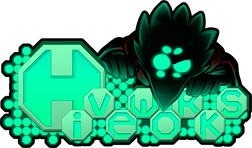And we’re back. Sorry this page is a little late–the script had to undergo some last minute changes that couldn’t be made until Cory got home from work! It’s all done now, though, and you’re looking at it. It is still Tuesday. 😛
Anyhow, here’s the second half of Cory’s worldbuilding notes for Fiah ranks/jobs.
Crew-Leaders are formally trained in the organization and management of relatively small teams. This profession is centered exclusively around leadership skills, so every Crew-Leader will also need recognized experience in his team’s line of work. Establishing recognition as a Crew-Leader is not necessary for most managerial positions – this particular job category is specifically intended to qualify promising citizens for leadership positions in other regulated fields. For example, anyone can lead a team of workers, but only a Crew-Leader who is also a Protector can lead a team of Protectors.
Healers are doctors, medics, and other practitioners within the medical field. All prospective Healers become fully competent emergency medics before being recognized as Fledgling. To become Full-Fledged, a Healer will obtain formal training and education in his chosen specialty, then prove his skill through a variety of practical trials and scholastic tests.
Ship-Menders have undertaken specialized technical training focused on the maintenance and repair of spacecraft. This field combines a solid practical understanding of various engineering principles, extensive practice and familiarity with common ship systems, and impeccable proficiency with the standard guides and equipment used in spacecraft repair. It is incredibly rare for a Ship-Mender to possess such encyclopedic knowledge that he can diagnose and repair any given system by rote; this is why all Ship-Menders carry, and are extremely competent with, highly sophisticated computerized guides capable of efficiently assisting the user in virtually any ship repair operation.
Diplomats are professional representatives, intermediaries, and negotiators. They study the attitudes and traditions of a wide range of social, political, philosophical, and religious groups, the better to establish rapport and avoid miscommunication. Not all Diplomats are envoys or ambassadors; many work as high-profile merchants, crisis negotiators, or other experts in the art of persuasion. Most large spaceships employ at least one Diplomat to act as counselor and mediator for the crew.
Explorers are citizens trained to use the proper methodology when investigating unexplored planets. They are taught to think logically, observe the subtlest details, avoid needless risks, refrain from unnecessary interference, create the minimum possible impact on foreign worlds, and so forth. Most Explorers are also trained in at least one other applicable field, such as an Explorer Space-Pilot, an Explorer Healer specialized in xenobiology, or even an Explorer Guardian charged with safeguarding the mission against unexpected threats.
Protectors are the police and public peacekeepers of Haalha. Their duties include enforcing planetary law, protecting citizens and visitors from harm, preventing and/or defusing violent conflict, and rendering aid to any endangered person. Protectors are permitted to carry restricted equipment related to their duty, including restraint devices and stun weaponry, but are not exempt from the global ban on the majority of handheld deadly weapons. These public servants are instilled with iron discipline and immense patience; they are also trained hand-to-hand combatants and expert grapplers, possessing excellent proficiency in the use of locks, takedowns, and submission holds to safely subdue an agitated citizen without injuring him.
Guardians are the soldiers of Haalha. They are trained to be effective and deadly in nearly any form of battle, from ground warfare to zero-gravity combat, and are skilled in the use of many kinds of weapons, armour, and battlefield equipment. Since most Haalhans find it difficult to reconcile their culture’s reverence for life with the sad necessity of deadly violence, the Guardians have developed an odd culture of martyrdom – if it is never justified to murder a sentient being, but is sometimes necessary to do so, then one must acknowledge that even the most fundamentally good person sometimes has no choice but to commit a terrible evil; by taking up arms, the Guardians not only protect their fellow citizens, but spare them from the murderer’s guilt by taking it all upon themselves. Haalhan society closely mirrors this philosophy in its attitude toward the Guardians; most Haalhans view their soldiers with a conflicted mix of respect, gratitude, pity, and irrational fear.







